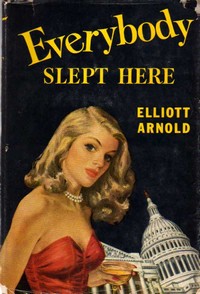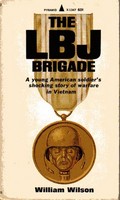 Elliott Arnold’s Everybody Slept Here is a tragi-comic account of Washington, D.C. during World War Two. Arnold’s descriptions of how the sleepy Southern capitol coped with a huge influx of people brought in by a government engaged in a global Industrial Age war will remind some readers of David Brinkley’s best-selling Washington at War. The atmosphere in both books is much the same. Housing is beyond a premium. Privileges and perks are as much a part of the everyday economy as dollars and cents. Enthusiastic idealists, opportunistic fixers, and effete society dames all find themselves jostled together in the best restaurants and the lowest dives. And as could be expected of any place with a large temporary population with some idle hours and spending money, more than the usual amount of booze and sex can be had.
Elliott Arnold’s Everybody Slept Here is a tragi-comic account of Washington, D.C. during World War Two. Arnold’s descriptions of how the sleepy Southern capitol coped with a huge influx of people brought in by a government engaged in a global Industrial Age war will remind some readers of David Brinkley’s best-selling Washington at War. The atmosphere in both books is much the same. Housing is beyond a premium. Privileges and perks are as much a part of the everyday economy as dollars and cents. Enthusiastic idealists, opportunistic fixers, and effete society dames all find themselves jostled together in the best restaurants and the lowest dives. And as could be expected of any place with a large temporary population with some idle hours and spending money, more than the usual amount of booze and sex can be had.
As both the hardback and paperback covers show, its publishers pushed Everybody Slept Here as a book about sex. Which it is, in the sense that it’s obvious that characters in the book have sex. But being a 1940s’ sex book, the tawdry details of the act itself are still left off-stage. So it seems pretty tame stuff today, and is by far the least interesting part of the book.
Everybody Slept Here centers on a few of the tenants of one of the better apartment houses in the city. It’s a hodge-podge of personalities: Willy, a simple but garrulous Rotarian from San Bernardino who’s turned out to be a pretty handy political operator on behalf of the Army; his wife, who’s found alcohol an effective way to calm her fears about taking the step from bridge clubs to Capitol society circles; Kitty, technically married to a soldier in the Pacific but “dating” heavily in his absence; a Robert MacNamara-like technocrat who discovers that efficiency has relatively little political value. There’s even the building’s concierge, a would-be antebellum princess with a relish for malicious gossip who’s stooped to dealing with the arrivistes brought by the war.
 Many of the characters Arnold sketches are one-dimensional and forgettable, but he does a marvelous job with Willy and his wife. Willy wears a girdle to rein in his gut and relaxes by sewing women’s’ dresses, and serves his time in uniform finding the best Scotch, the finest steaks, and whatever other amenities the Congressmen and generals need. It would be easy to make him preposterous and contemptible. Instead, Arnold is able take us past first impressions and show that he is also an honorable man in his own way, and a tender husband to his fragile wife.
Many of the characters Arnold sketches are one-dimensional and forgettable, but he does a marvelous job with Willy and his wife. Willy wears a girdle to rein in his gut and relaxes by sewing women’s’ dresses, and serves his time in uniform finding the best Scotch, the finest steaks, and whatever other amenities the Congressmen and generals need. It would be easy to make him preposterous and contemptible. Instead, Arnold is able take us past first impressions and show that he is also an honorable man in his own way, and a tender husband to his fragile wife.
The real merit of Everybody Slept Here, though, is not in Arnold’s treatment of the characters but in his precision in depicting the environment of wartime Washington. Nothing in his portrayal of the military, of the working of the political machines of industrial warfare, or of way people worked, ate, drank, and partied rings false. Everybody Slept Here could easily substitute for Washington at War as an introduction to its subject, and it lacks the affectionate haze leant by the distance of forty years to some aspects Brinkley’s book.
This is certainly not a great novel, and I won’t start campaigning for its reissue, but it is a fairly entertaining one. And it’s a grown-up’s book, by which I mean that it’s one in which characters act and make choices in a way that adults usually have to in the real world: not abruptly, not dramatically, and not as cleanly and neatly as they might like.
There’s one big exception to this. Kitty eventually throws herself out the window after making love with a disabled soldier. It’s so abrupt, melodramatic, and clean and neat that it’s the one thing in the book that IS preposterous.
Other Comments
- · Russell Mahoney, New York Times, 30 May 1948
- Everybody Slept Here must be condemned by the conscientious reviewer as superfluous. Some parts only; by far the greater part of this lively tale of wartime Washington has a very genuine interest, ranging from the real human insight which is the novelist’s stock in trade down to the clever reporter’s tricks which the rank file of novelists use to piece out their insight.
- · Joseph Holbrook Jackson, San Francisco Chronicle, 16 April 1948
- Mr. Arnold is a novelist. And even when he’s purposely writing with sales figures in his eyes, he can’t help making his book a good deal better than (a) it sounds here, or (b) the bosomy jacket will suggest to you. For Mr. Arnold saw something of wartime Washington himself. He had a chance to see what went on behind some of the protective coloration that was called “brass.” He learned how things get done in certain kinds of groups, what roles the adroit politician might play when it was wartime and normal rules had to go out of the window…. And these things he impales sharply in his story. More, he saw also what the decent, reasonably forthright regular Army career officer was like, and came to understand what it was that really made the Army tick.
- · Springfield Republican, 25 April 1948
- While Mr. Arnold isn’t exactly reticent about sex, he has come the closest yet of all the writers who have tried to explain what the nation’s capitol was like during World War II…. It is a rough, lively and often very funny book, with an undercurrent of seriousness that shows Mr. Arnold to be a most competent critic of his fellow men.
- · Winnipeg Free Press, 4 September 1948
- In an era of uninhibited novels, Mr. Elliott’s [sic] study of a group of heels in wartime Washington deserves the prize for frankness. The author, who writes with brutal clarify and often poignant insight, leaves no stone unturned in his quest for the slimy aspect of the U.S. capital at a time when the world was battling Hitler and his cohorts.
Once, however, the initial shock of meeting such a collection of over-sexed, neurotic and generally frowsy characters is overcome, one can see in the purpose of the writer an honesty and a skill which will commend it to the attention of all those who like a hard-bitten, honest and frankly realistic book.
Find a copy
Everybody Slept Here, by Elliott Arnold
New York: Duell, Sloan and Pearce, 1948
 Moskowitz mentions that the club has William Wilson’s The LBJ Brigade, one of the earliest novels about the Vietnam War, awaiting a deal with the right publisher. He also offers several more suggestions to the list of neglected books discussed in The Stone Reader:
Moskowitz mentions that the club has William Wilson’s The LBJ Brigade, one of the earliest novels about the Vietnam War, awaiting a deal with the right publisher. He also offers several more suggestions to the list of neglected books discussed in The Stone Reader:
 Elliott Arnold’s
Elliott Arnold’s  Many of the characters Arnold sketches are one-dimensional and forgettable, but he does a marvelous job with Willy and his wife. Willy wears a girdle to rein in his gut and relaxes by sewing women’s’ dresses, and serves his time in uniform finding the best Scotch, the finest steaks, and whatever other amenities the Congressmen and generals need. It would be easy to make him preposterous and contemptible. Instead, Arnold is able take us past first impressions and show that he is also an honorable man in his own way, and a tender husband to his fragile wife.
Many of the characters Arnold sketches are one-dimensional and forgettable, but he does a marvelous job with Willy and his wife. Willy wears a girdle to rein in his gut and relaxes by sewing women’s’ dresses, and serves his time in uniform finding the best Scotch, the finest steaks, and whatever other amenities the Congressmen and generals need. It would be easy to make him preposterous and contemptible. Instead, Arnold is able take us past first impressions and show that he is also an honorable man in his own way, and a tender husband to his fragile wife.